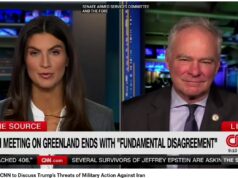 While those of us who can add and subtract see that Paul Ryan’s latest absurdist budget is simply a ploy to allow the Teahadists in the House of Representatives to cast another mindless vote, I recognize that the Senate budget that was released this week is also destined to receive only Democratic votes in that body and not see the light of day in the House. Leaving aside whether the Senate budget cuts spending enough or raises revenue enough by closing egregious tax loopholes, I simply want to defend one provision in that budget, a provision the corporate media is already discounting: $100 billion for infrastructure spending.
While those of us who can add and subtract see that Paul Ryan’s latest absurdist budget is simply a ploy to allow the Teahadists in the House of Representatives to cast another mindless vote, I recognize that the Senate budget that was released this week is also destined to receive only Democratic votes in that body and not see the light of day in the House. Leaving aside whether the Senate budget cuts spending enough or raises revenue enough by closing egregious tax loopholes, I simply want to defend one provision in that budget, a provision the corporate media is already discounting: $100 billion for infrastructure spending.
First and foremost, because of the near-zero interest rate policies of the Federal Reserve (and, for that matter, the central banks of most of the world), right now in real terms, the government’s cost of borrowing is negative for as long as 20 years into the future. In other words, borrowing money right now is not costing the government anything in real interest. In terms most people can relate to, suppose you were offered the chance to buy a house with a 20-year mortgage, interest-free? Sounds like a deal too good to pass up, huh? That’s the situation right now with debt and the federal government.
Zero real interest is partially why the GOP hue and cry about immediate budget deficits is fallacious. The other reason is that such emphasis skews the need for real, long-term deficit reduction by focusing on that long-term problem as if it can be solved by one draconian attack on the working and middle classes in the short run. Those negative interest rates won’t last forever, so now is the time to attack the real deficit problem, which is a structural one.
No one who has driven recently through NoVA or Hampton Roads or flown into JFK or Newark airports or ridden the so-called “fast” Acela train between Washington and Boston can doubt the need for infrastructure expenditures. The same goes for the need to upgrade our electric grid or bring fiber-optic networks to more of the country, or to rebuild crumbling urban schools. Well-run businesses often expand more when the interest rate for borrowing is very low. The dividends of future growth make that action good fiscal sense. Government should operate in the same, business-like manner.
So, my plea is that people not consider the Senate provision for infrastructure just another “stimulus package” or a provision to be bargained away. It makes economic sense. At the same time, I also strongly recognize that the long-term deficit of the nation must be controlled.
The whole rationale for the tax increases of the Clinton years and the constraint of federal spending in the Nineties was to create surpluses to pay down the national debt in anticipation of the retirement of the baby boom generation and the explosion in Social Security and Medicare costs. We all know what happened to that plan. Alan Greenspan fretted about the surpluses, and the Bush administration lowered tax rates, especially on the wealthy and those who earn money from dividends and capital gains. That created the structural deficit we have today, not to mention what starting two wars and offering a prescription drug plan for Medicare without paying for them did to the deficit. Not only that, but the Bush people privatized many of the support operations of the military and allowed the pharmaceutical industry to write the Part D Medicare benefit plan, thus guaranteeing that costs to the government would skyrocket.
We progressives ultimately will have to accept that growth in spending on earned benefits like Medicare has to be contained in any long-term deficit plan. At the same time, GOPers have to accept lower defense spending and the elimination of egregious tax expenditures that favor those with the ability to lobby Congress and provide campaign contributions. However, long-term deficit reduction need not preclude spending now on needed investments in infrastructure, green energy, and education. Those investments will more than pay for themselves in the future.
The government has just guaranteed a reduction in economic growth this year with the sequester, a reduction estimated by the Congressional Budget Office of about 0.6 percent this year. According to Larry Summers, former Treasury Secretary and economist, “The type of government spending that is most likely to boost GDP is related to public investment…roads, bridges, etc. This makes sense, since it involves investment and paying people to work, as opposed to government transfer payments.”
The Senate budget plan with its infrastructure spending not only makes sense from a policy standpoint. It makes sense economically. With all the evidence pointing to the benefits of that spending, sadly I fully expect that the spending on infrastructure will be “bargained” away in some “grand bargain.” Why? Because rational thinking is not guiding any of the stuff coming out of Congress right now. Government is broken, the poison of ideology is driving congressional votes and the future will suffer for it.











